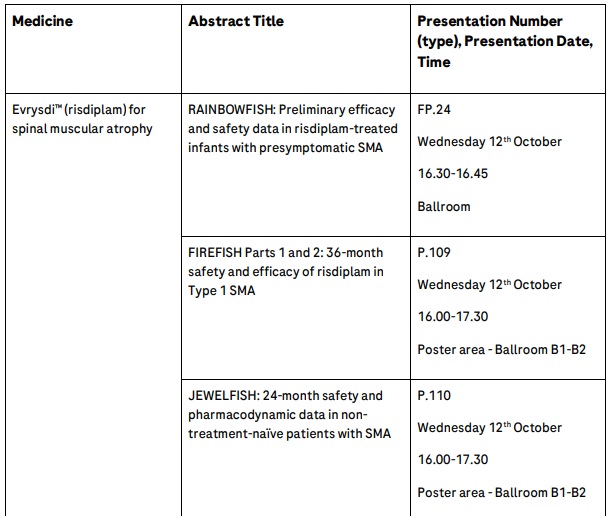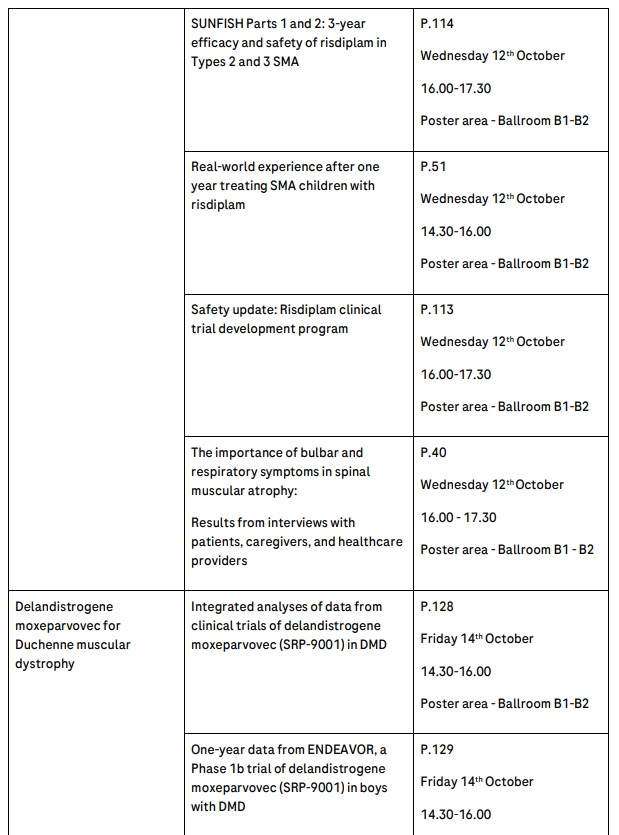
New positive data from Evrysdi, a treatment for spinal muscular atrophy (SMA), a progressive neuromuscular disease that can be fatal
Data from the gene therapy programme for Duchenne muscular dystrophy (DMD), a progressive disease that leads to premature death, reinforce confidence in the most advanced Phase 3 study currently underway
Study designs of two new trials in generalised myasthenia gravis (gMG), a rare chronic autoimmune disease, and facioscapulohumeral muscular dystrophy (FSHD), a genetic muscle disorder
Basel, 05 October 2022 - Roche (SIX: RO, ROG; OTCQX: RHHBY) today announced that new data from its industry-leading neuromuscular portfolio will be presented at the World Muscle Society (WMS) congress, 11th-15th October 2022. These data demonstrate Roche’s commitment to advancing clinical understanding and supporting the development of treatments for people living with neuromuscular disorders.
“The continued expansion of our neuromuscular portfolio demonstrates our commitment to developing innovative medicines for a range of neurological disorders,” said Levi Garraway, M.D., Ph. D., Roche’s Chief Medical Officer and Head of Global Product Development. “Through our ongoing research and development and our strong partnerships with patient communities, we continue to address the needs of people with rare neuromuscular conditions.”
Spinal muscular atrophy (SMA)
SMA is a severe, progressive neuromuscular disease that can be fatal. It is the leading genetic cause of infant mortality, affecting approximately one in 10,000 babies. For the first time, Roche will present new 2-year exploratory efficacy data from the JEWELFISH study in a broad range of patients previously treated with an SMA-targeting therapy, including nusinersen (SpinrazaR) or onasemnogene abeparvovec (ZolgensmaR).
Additional data from Evrysdi’s comprehensive clinical development programme will also be presented, including:
Preliminary efficacy and safety data from the RAINBOWFISH study, in pre-symptomatic babies from birth to 6 weeks of age (at first dose), which showed that all babies treated with Evrysdi for one-year or more were alive without permanent ventilation, maintained swallowing and feeding abilities, and had not required hospitalisation.
Three-year data from the SUNFISH study, further highlighting the long-term efficacy and safety profile of Evrysdi in a broad population of children, teenagers and adults with SMA.
Three-year pooled safety and efficacy data from Part 1 and Part 2 of the FIREFISH study which showed that after three years of treatment at the pivotal dose (n=58), 84% of infants were alive and did not require permanent ventilation. Overall, babies maintained or improved their motor skills in terms of developmental milestones and motor function between Month 24 and Month 36.
Duchenne muscular dystrophy (DMD)
DMD is a rare X-linked, progressive neuromuscular disease caused by mutations in the DMD gene that disrupts the production of functional dystrophin protein, leading to a loss of muscle function and premature death. It is one of the most common fatal genetic disorders, affecting approximately one in every 3,500 to 5,000 male births worldwide. Results from three ongoing clinical trials of gene therapy delandistrogene moxeparvovec in DMD will be presented:
Long-term, four-year data from Study 101, an open-label Phase 1/2a study evaluating the safety of delandistrogene moxeparvovec in four ambulatory participants aged between 4-8 years old with DMD. The enduring response and safety observed in the study support the continuation of clinical trials assessing delandistrogene moxeparvovec using single dose gene therapy in patients with DMD.
One-year data from ENDEAVOR, an open-label Phase 1b study evaluating the expression and safety of commercially representative delandistrogene moxeparvovec in four cohorts of DMD patients, representing different stages of disease progression. One-year safety and functional data and 12-week expression data from Cohort 1 will be presented. These data reinforce our confidence in the probability of success of EMBARK, our first Phase 3 study using intended commercial process material, which is now fully enrolled.
Integrated analyses comparing data from patients treated with delandistrogene moxeparvovec with an external comparator cohort will be presented, including collective safety data from Study 101, Study 102 and ENDEAVOR.
Generalised Myasthenia Gravis (gMG)
Myasthenia gravis is a rare chronic autoimmune, neuromuscular disease that causes weakness in skeletal muscles. It most commonly affects the muscles that control the eyes and eyelids, facial expressions, chewing, swallowing and speaking as well as limb musculature and muscles of respiration.
Roche will present the study design and methodology for LUMINESCE, a Phase 3 randomised, double-blind, placebo-controlled, multicentre study evaluating the efficacy and safety of satralizumab versus placebo on function in daily life in people with gMG. The LUMINESCE study is enrolling a large and broad population of 240 people with gMG, aged 12 years and older, including patients with various disease-causing autoantibodies.
Facioscapulohumeral Muscular Dystrophy (FSHD)
FSHD is a rare autosomal dominant genetic disorder characterised by progressive weakening of the skeletal muscles in the face, shoulders, arms, trunk and limbs. There is currently no approved therapy for this disease.
Roche will present the study design for MANOEUVRE, a multi-center, randomised, placebo-controlled, double-blind, Phase 2 study, that will investigate the effect of GYM329 (RO7204239), an investigational anti-myostatin antibody, in patients with FSHD.
The full range of data from Roche’s clinical development programme in neuromuscular disease being presented at WMS 2022 include:



Full session details and data presentations listing for the WMS 2022 Hybrid Congress can be found at the meeting website: www.worldmusclesociety.org
Follow Roche on Twitter via @Roche and keep up to date with WMS 2022 Congress news and updates by using the hashtag #RocheAtWMS2022, #WMS and #neuromuscular
About Evrysdi (risdiplam)
Evrysdi is a survival motor neuron 2 (SMN2) splicing modifier designed to treat SMA caused by mutations in chromosome 5q that lead to survival motor neuron (SMN) protein deficiency. Evrysdi is administered daily at home in liquid form by mouth or by feeding tube.
Evrysdi is designed to treat SMA by increasing and sustaining the production of the SMN protein in the central nervous system (CNS) and peripheral tissues. SMN protein is found throughout the body and is critical for maintaining healthy motor neurons and movement.
Evrysdi was granted PRIME designation by the European Medicines Agency (EMA) in 2018 and Orphan Drug Designation by the U.S Food and Drug Administration in 2017. In 2021, Evrysdi was awarded Drug Discovery of the Year by the British Pharmacological Society as well as the Society for Medicines Research award for Drug Discovery. Evrysdi is currently approved in 91 countries and the dossier is under review in a further 18 countries. To date, more than 7,000 adults, children and babies have been treated with Evrysdi worldwide.
About delandistrogene moxeparvovec
Delandistrogene moxeparvovec (SRP-9001; rAAVrh74.MHCK7.micro-dystrophin) is an investigational gene therapy aimed to deliver the micro-dystrophin-encoding transgene directly to the skeletal and cardiac muscle for the targeted production of the SRP-9001-dystrophin protein to enable a durable clinical response. In December 2019, Roche partnered with Sarepta to combine Roche’s global reach and drug development and regulatory expertise to accelerate access to delandistrogene moxeparvovec for patients
About ENSPRYNG® (satralizumab)
ENSPRYNG, which was designed by Chugai, a member of the Roche Group, is a humanised monoclonal antibody that targets interleukin-6 (IL-6) receptor activity. ENSPRYNG was designed using novel recycling antibody technology which, compared to conventional technology, allows for longer duration of the antibody and subcutaneous dosing every four weeks.
Positive Phase III results for ENSPRYNG, as both monotherapy and in combination with baseline immunosuppressive therapy, demonstrate that IL-6 inhibition is an effective therapeutic approach for neuromyelitis optica spectrum disorder ( NMOSD). ENSPRYNG is currently approved for NMOSD in 72 countries with further applications under review with numerous regulators. Roche continues to investigate ENSPRYNG in further indications including generalised myasthenia gravis (gMG), Myelin Oligodendrocyte Glycoprotein Antibody-associated Disease (MOGAD) and Autoimmune Encephalitis (AIE).
ENSPRYNG has been designated as an orphan drug for gMG, MOGAD, AIE (NMDAR) and NMOSD in the United States. ENSPRYNG has also been designated as an orphan drug for NMOSD in Europe, Russia and Japan. In addition, it was granted Breakthrough Therapy Designation for the treatment of NMOSD by the FDA in December 2018.
About GYM329 (RO7204239)
GYM329 is an investigational anti-myostatin antibody that is designed to increase muscle growth by binding to inhibiting myostatin, a natural negative regulator of muscle growth. By binding to the protein, GYM329 was created with the aim of blocking the function of myostatin, therefore helping muscles to grow in size and strength.
About Roche in Neuroscience
Neuroscience is a major focus of research and development at Roche. Our goal is to pursue groundbreaking science to develop new treatments that help improve the lives of people with chronic and potentially devastating diseases.
Roche has both approved and investigational medicines across multiple sclerosis, spinal muscular atrophy, neuromyelitis optica spectrum disorder, myasthenia gravis, Alzheimer’s disease, Huntington’s disease, Parkinson’s disease and Duchenne muscular dystrophy. Together with our partners, we are committed to pushing the boundaries of scientific understanding to solve some of the most difficult challenges in neuroscience today.
About Roche
Roche is a global pioneer in pharmaceuticals and diagnostics focused on advancing science to improve people’s lives. The combined strengths of pharmaceuticals and diagnostics under one roof have made Roche the leader in personalised healthcare – a strategy that aims to fit the right treatment to each patient in the best way possible.
Roche is the world’s largest biotech company, with truly differentiated medicines in oncology, immunology, infectious diseases, ophthalmology and diseases of the central nervous system. Roche is also the world leader in in vitro diagnostics and tissue-based cancer diagnostics, and a frontrunner in diabetes management.
Founded in 1896, Roche continues to search for better ways to prevent, diagnose and treat diseases and make a sustainable contribution to society. The company also aims to improve patient access to medical innovations by working with all relevant stakeholders. More than thirty medicines developed by Roche are included in the World Health Organization Model Lists of Essential Medicines, among them life-saving antibiotics, antimalarials and cancer medicines. Moreover, for the twelfth consecutive year, Roche has been recognised as one of the most sustainable companies in the Pharmaceuticals Industry by the Dow Jones Sustainability Indices (DJSI).
The Roche Group, headquartered in Basel, Switzerland, is active in over 100 countries and in 2020 employed more than 100,000 people worldwide. In 2020, Roche invested CHF 12.2 billion in R&D and posted sales of CHF 58.3 billion. Genentech, in the United States, is a wholly owned member of the Roche Group. Roche is the majority shareholder in Chugai Pharmaceutical, Japan